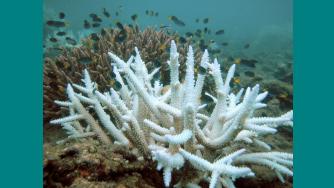
Corals may have developed a preference for consuming plastic bits, putting them at risk of being choked by the indigestible materials, a study has found.
Scientists have long known that marine animals mistakenly eat plastic debris because the tiny bits of floating plastic might look like prey.
The study of plastic ingestion by corals by researchers from Duke University in the US suggests there may be an additional reason for the potentially harmful behaviour.
Visual cues, such as a resemblance to prey, do not factor into the appeal because corals have no eyes, researchers said.
Corals in the experiments ate all types of plastics but preferred unfouled microplastics by a threefold difference over microplastics covered in bacteria.
This suggests the plastic itself contains something that makes it tasty.
When plastic comes from the factory, it has hundreds of chemical additives on it.
Any one of these chemicals or a combination of them could be acting as a stimulant that makes plastic appealing to corals.
Further research will be needed to identify the specific additives that make the plastic so tasty to corals and determine if the same chemicals act as feeding stimulants to other marine species, researchers said.
Microplastics: Know More - Microplastics, tiny pieces of weathered plastic less than five millimetres in diameter, began accumulating in the oceans four decades ago and are now ubiquitous in the marine environment.
- They pose a major threat to foraging sea animals, including many species of birds, turtles, fish, marine mammals and invertebrates.
- Since plastic is largely indigestible, it can lead to intestinal blockages, create a false sense of fullness or reduce energy reserves in animals that consume it.
- About eight per cent of the plastic that coral polyps in the study ingested was still stuck in their guts after 24 hours.
- The biological effects of most of these compounds are still unknown, but some, such as phthalates, are confirmed environmental oestrogens and androgens-hormones that affect sex determination.
- The researchers hope their findings will encourage scientists to explore the role taste plays in determining why marine organisms ingest microplastics.